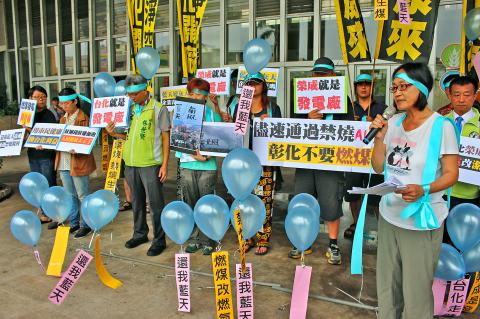Environmental Protection Administration (EPA) Minister Lee Ying-yuan (李應元) yesterday said that he is planning to transform the agency into a higher-ranking “ministry of environment and resources” in 18 months.
In a radio interview hosted by independent journalist and filmmaker Kevin Lee (李惠仁), the minister reiterated his policies of air pollution remediation, soil contamination solutions and illegal dumping prevention.
“The EPA is no longer the ‘submissive daughter-in-law’ under the [now defunct] Department of Health and the agency should get rid of the traditional mindset to deal with increasingly diversified environmental issues. I will push for legislation authorizing the establishment of a ‘ministry of environment and resources’ within a year and establish the ministry in 18 months,” Lee Ying-yuan said.

Photo: Chang Tsung-chiu, Taipei Times
Kevin Lee said air pollution is the issue that concerns the public most, as more than 100 questions sent by Internet users asked about measures to ease air pollution.
“It is ridiculous that the public cannot breathe clean air. We plan to make the six-year Clean Air Program approved by the former administration a four-year project. The EPA will allocate an air pollution fund of NT$30 billion [US$925.9 million] to reduce ‘red level’ incidents by 20 percent in two years and by half in four years,” Lee Ying-yuan said.
According to the EPA’s four-color categorization of PM2.5 — fine particulate matter less than 2.5 micrometers in diameter — “red” is the second-most severe level, corresponding to PM2.5 levels of 59 to 64 micrograms per cubic meter.
The EPA will ask the power sector to increase the use of Australian coal, which has lower sulfur content and is more environmentally friendly, despite lower energy content, he said.
The agency will also encourage factories to replace crude oil with diesel, because crude oil generates several hundred times more sulfides, Lee Ying-yuan said.
While EPA Deputy Minister Thomas Chan (詹順貴) said that a rejected Yulin County ban on bituminous coal might be accepted if the wholesale ban was revised to a partial restriction, Lee Ying-yuan said that the ban was rejected on the ground that it involved national energy management and was within the Bureau of Energy’s jurisdiction.
Lee Ying-yuan said the problem of farm contamination stems from electroplating plants, whose wastewater was on many occasions found to pollute farmland, and the problem could not be solved without removing electroplating plants from farms.
The agency will set up industry parks to separate farms from polluting industries, he said.
The minister also said he had negotiated with the Taiwan High Prosecutors’ Office to investigate illegal dumping of industrial waste, and mostly notably, of slag, because he suspected that licensed recyclers have colluded with illegal reprocessors, adding that efforts depend on public participation to crack down on illegal dumping.

Taiwan has received more than US$70 million in royalties as of the end of last year from developing the F-16V jet as countries worldwide purchase or upgrade to this popular model, government and military officials said on Saturday. Taiwan funded the development of the F-16V jet and ended up the sole investor as other countries withdrew from the program. Now the F-16V is increasingly popular and countries must pay Taiwan a percentage in royalties when they purchase new F-16V aircraft or upgrade older F-16 models. The next five years are expected to be the peak for these royalties, with Taiwan potentially earning

STAY IN YOUR LANE: As the US and Israel attack Iran, the ministry has warned China not to overstep by including Taiwanese citizens in its evacuation orders The Ministry of Foreign Affairs (MOFA) yesterday rebuked a statement by China’s embassy in Israel that it would evacuate Taiwanese holders of Chinese travel documents from Israel amid the latter’s escalating conflict with Iran. Tensions have risen across the Middle East in the wake of US and Israeli airstrikes on Iran beginning Saturday. China subsequently issued an evacuation notice for its citizens. In a news release, the Chinese embassy in Israel said holders of “Taiwan compatriot permits (台胞證)” issued to Taiwanese nationals by Chinese authorities for travel to China — could register for evacuation to Egypt. In Taipei, the ministry yesterday said Taiwan

Taiwan is awaiting official notification from the US regarding the status of the Agreement on Reciprocal Trade (ART) after the US Supreme Court ruled US President Donald Trump's global tariffs unconstitutional. Speaking to reporters before a legislative hearing today, Premier Cho Jung-tai (卓榮泰) said that Taiwan's negotiation team remains focused on ensuring that the bilateral trade deal remains intact despite the legal challenge to Trump's tariff policy. "The US has pledged to notify its trade partners once the subsequent administrative and legal processes are finalized, and that certainly includes Taiwan," Cho said when asked about opposition parties’ doubts that the ART was

If China chose to invade Taiwan tomorrow, it would only have to sever three undersea fiber-optic cable clusters to cause a data blackout, Jason Hsu (許毓仁), a senior fellow at the Hudson Institute and former Chinese Nationalist Party (KMT) legislator, told a US security panel yesterday. In a Taiwan contingency, cable disruption would be one of the earliest preinvasion actions and the signal that escalation had begun, he said, adding that Taiwan’s current cable repair capabilities are insufficient. The US-China Economic and Security Review Commission (USCC) yesterday held a hearing on US-China Competition Under the Sea, with Hsu speaking on